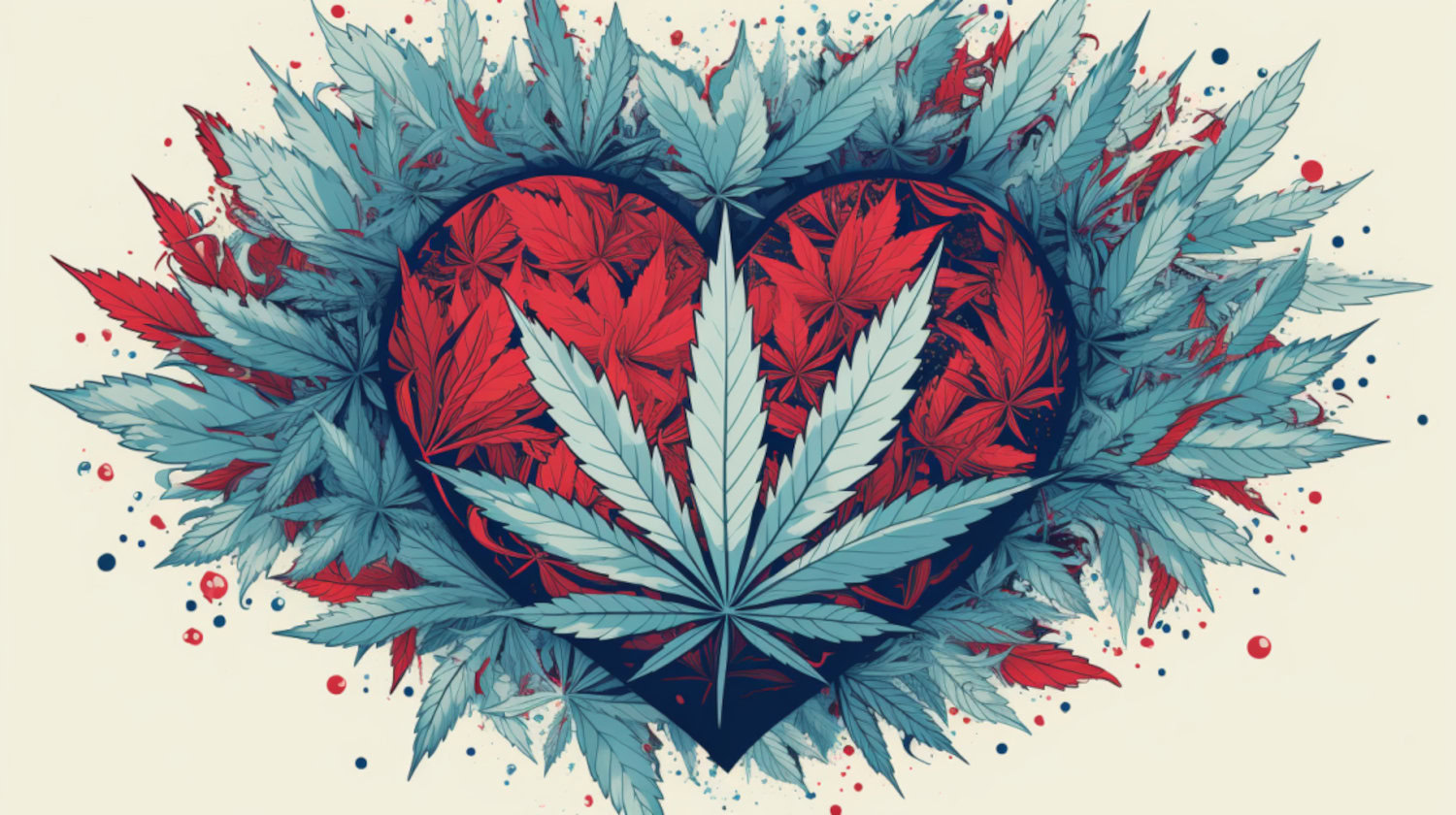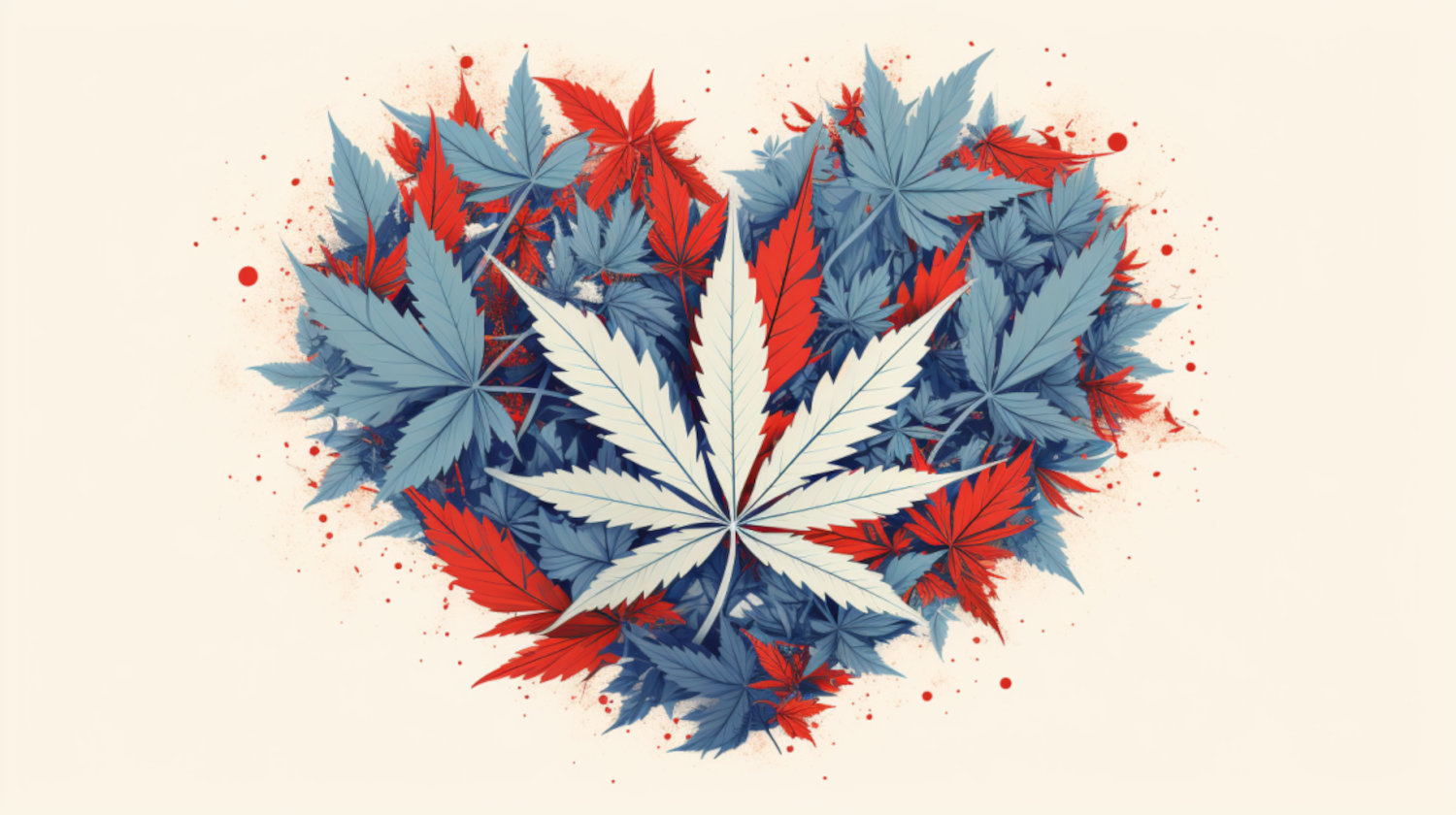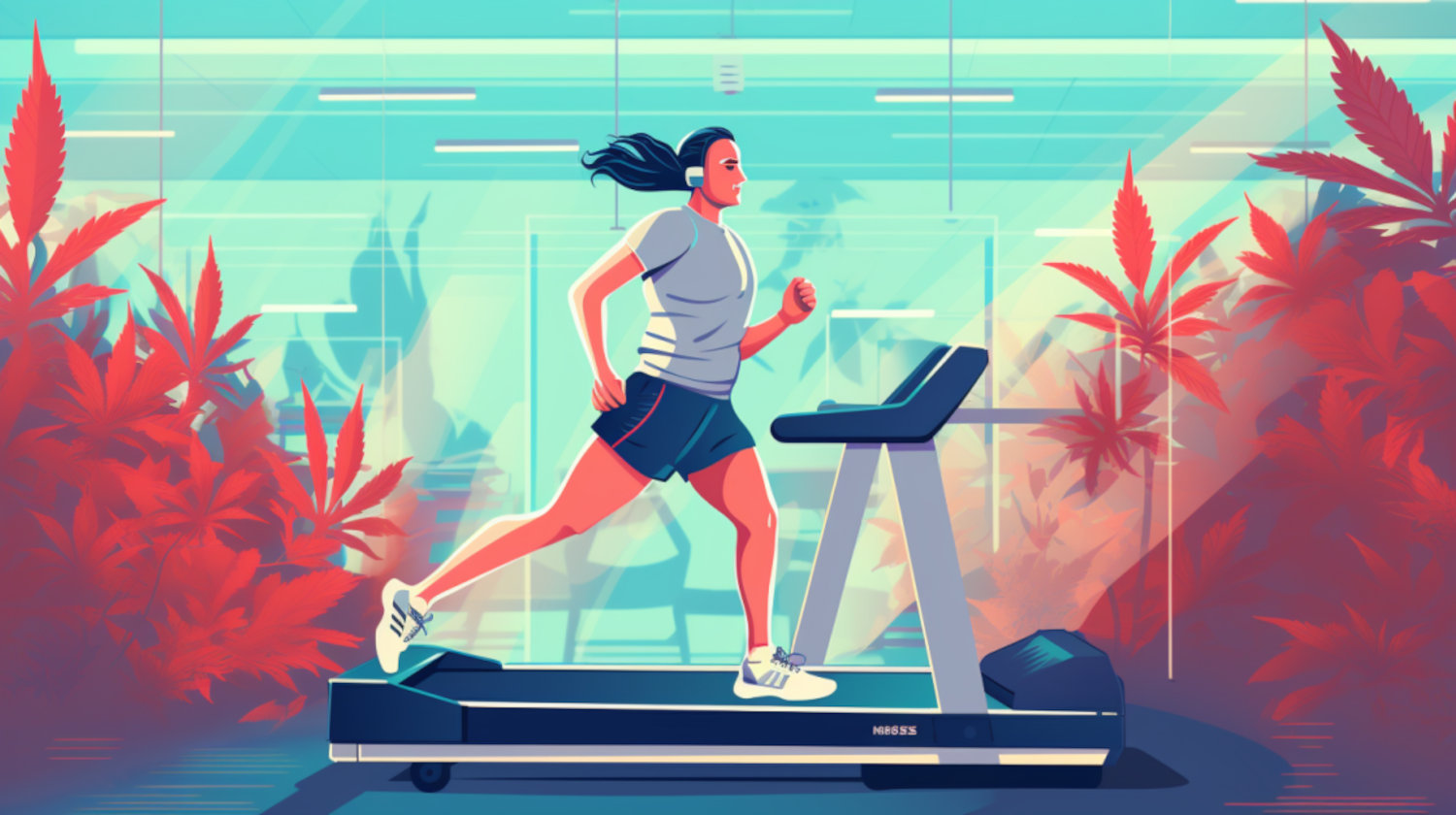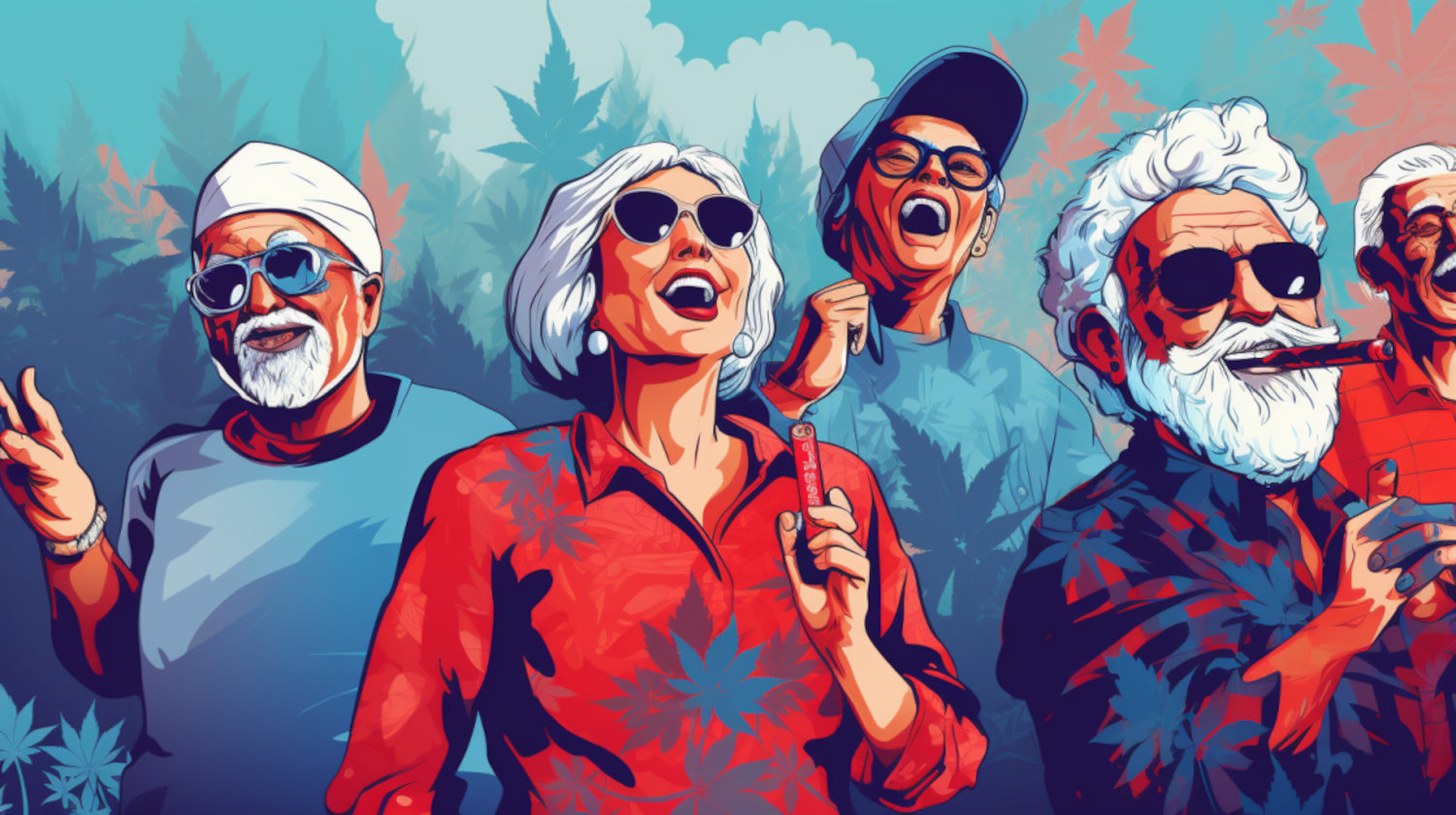In This Article
- Can Weed Affect Heart Rate?
- Tips to Stop Fast Heart Rate from Weed
- Step 1: Sit or lie down in a calm space
- Step 2: Breathe deeply
- Step 3: Hydrate and eat a light snack
- Step 4: Distract yourself
- Step 5: Monitor your heart rate
- How Long Does It Take for Your Heart Rate to Return to Normal?
- THC Dose
- Method of Consumption (Inhaled vs. Edible)
- Tolerance Level
- Interactions With Other Substances
- Tips to Prevent Your Heart Racing From Weed
- Heart Rate Factors and Choosing Cultivars, Phenotypes, and Terpenes
- Cultivars
- Phenotypes
- Terpenes
- When to Contact Your Doctor
- References
Key Takeaways
- THC can raise your heart rate by stimulating your “fight or flight” response.
- To calm a racing heart: Sit or lie down, breathe deeply, hydrate, and relax.
- Prevent it next time: Choose low-THC or balanced strains, avoid stimulants, and start with a low dose.
Ever feel your heart pounding after getting high? You're not alone.
Cannabis can be relaxing and euphoric for many people. But sometimes, instead of mellow vibes, you get an unexpected side effect: a racing heart that won’t slow down.
If your first thought is, “Am I okay?”, you’re not overreacting. Feeling your heart thump hard and fast after using cannabis can be unsettling, especially for new users or those with underlying health concerns. The good news? In most cases, it’s temporary and not harmful to otherwise healthy people.
We turned to Dr. Brian Kessler, NuggMD’s medical director, for answers. Why does smoking weed make your heart race? And how to stop fast heart rate from weed?
Can Weed Affect Heart Rate?

Yes. THC can increase your heart rate, especially within the first 15 to 30 minutes after consumption.
Dr. Brian Kessler, Medical Director at NuggMD, explains: “THC increases heart rate through interaction with the parasympathetic and sympathetic nervous systems."
Your sympathetic nervous system triggers your "fight or flight" response.
The parasympathetic system controls "rest and digest" functions.
If your heart is racing from weed, it's because THC acts on the sympathetic or “fight or flight” response. THC can temporarily lead to a rapid heart rate, changes in pressure, or how efficiently oxygen flows throughout your body.1
Depending on your tolerance, dose, and delivery method, Dr. Kessler notes “heart rate may increase by 20 to 50 beats per minute, potentially reaching 120 BPM or higher.” That’s within the range of mild tachycardia, a medical term for a fast heartbeat.
In general, using cannabis with THC will raise your heart rate. As tolerance develops over time, some people may become less sensitive to this effect.
The information in this website, including but not limited to images, graphics, text and other materials, is included for informational purposes only. None of the material on this site is intended to substitute for professional medical advice. Always seek advice from your qualified physician or healthcare provider if you have questions before starting any new healthcare regimen, and never disregard professional medical advice based on anything you read on this website or any other website.
This information, including images, is not medical advice. Consult a physician before starting or stopping medications or herbs, including cannabis. Information not evaluated by FDA and not intended to diagnose, treat, cure, or prevent disease.
Tips to Stop Fast Heart Rate from Weed
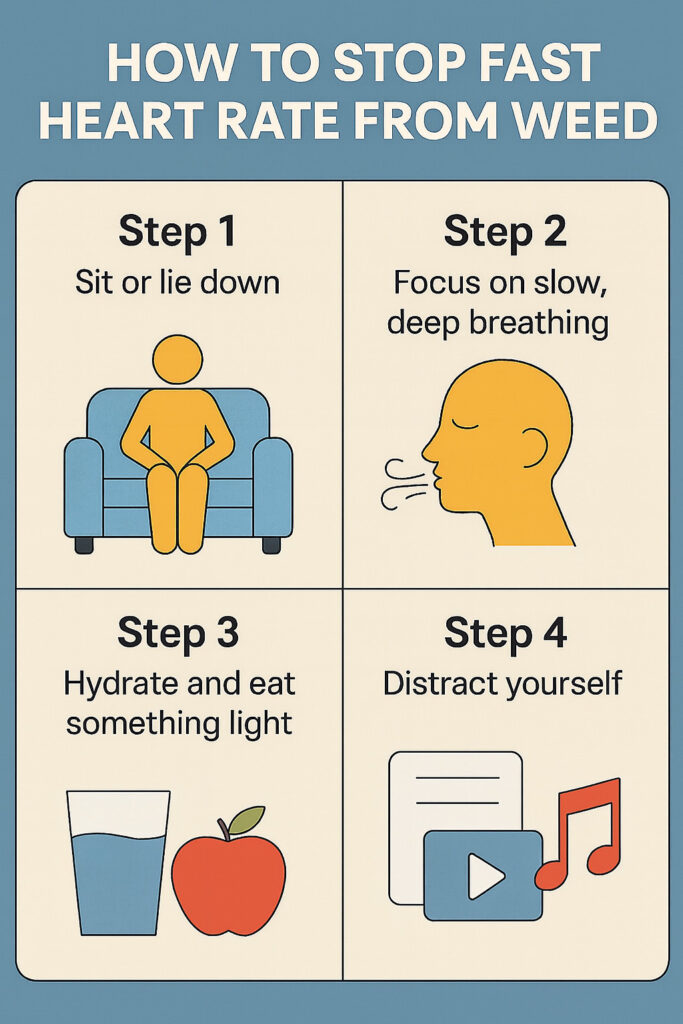
A fast heartbeat can feel scary, but try to stay calm. This feeling usually resolves itself within 5-10 minutes.
If you feel your heart racing from weed, try the following:
Step 1: Sit or lie down in a calm space
Find a quiet, safe spot and let your body decompress. Get comfortable in a chair or lie down.
Dr. Kessler recommends, “Taking steps to reduce your heart rate can include reducing exposure to high heat, physical activity, and remaining seated or lying down.”
Step 2: Breathe deeply
Measured breathing can help. Inhale for four counts through your nose, then exhale six counts through your mouth. This stimulates your ‘rest and digest’ parasympathetic system, encouraging a slower heart rate.
Step 3: Hydrate and eat a light snack
Drink water and eat something. Water supports detoxification and hydration. A snack helps stabilize blood sugar and tells the body to focus on digestion.
Step 4: Distract yourself
Watch a funny show, talk with a friend, or listen to calming music to break the anxiety loop. Or close your eyes and imagine your happy place, such as sitting on a warm beach watching gentle waves or walking through a quiet, cool wood.
Step 5: Monitor your heart rate
Even though this feeling is likely to pass, if your resting heart rate stays above 100 BPM for more than 30 minutes or you experience chest pain, faintness, or shortness of breath, seek medical attention.
“A resting heartbeat should never be above 100 BPM; above this, it’s recommended to seek medical attention,” says Dr. Kessler.
How Long Does It Take for Your Heart Rate to Return to Normal?
For most people, cannabis-related heart rate spikes subside within 15 to 30 minutes, but can vary based on:
- THC Dose
- Method of Consumption
- Tolerance Level
- Interactions With Other Substances
All of these factors, either alone or in combination with one another can influence how your body processes cannabis and the length of its effects on heart rate.
THC Dose
THC levels in cannabis products vary widely. A higher percentage of THC can contribute to a racing heart, especially in new users.
Method of Consumption (Inhaled vs. Edible)
Inhaled cannabis, either smoked or vaped, acts quickly and may cause a rise in heart rate within the first few minutes. But since the peak of inhaled cannabis also fades quickly, any heart pounding usually subsides quickly.
Edibles take longer to peak and may sustain an elevated heart rate for an extended period. Since edibles take longer to affect you, an increased heart rate may not appear until 30-40 minutes after dosing. The symptoms may persist until the effects of the edible begin to subside.
Tolerance Level
How often you use cannabis, the potency of the cannabis consumed, and your personal body chemistry can determine your tolerance level. With regular use over time, the CB1 receptors in your endocannabinoid system may become less sensitive to THC, reducing the chance of a racing heart.
Interactions With Other Substances
Whether cannabis was mixed with other drugs (e.g., caffeine, alcohol, or medications)
Many drugs can stimulate a higher heart rate. Check with your doctor before using cannabis products with your prescription medications. Alcohol can also cause a heart rate to spike.
Tips to Prevent Your Heart Racing From Weed
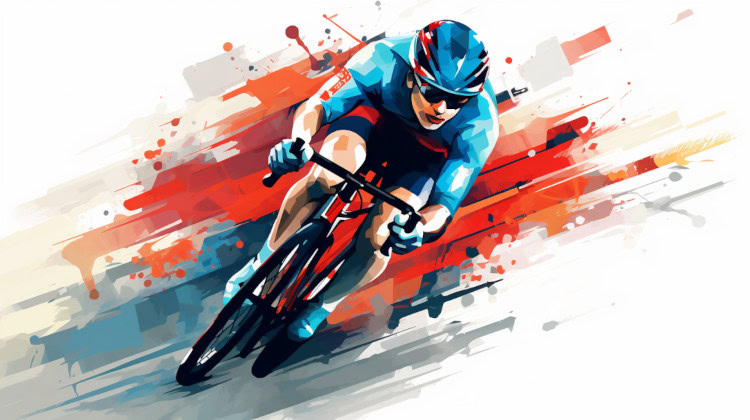
With a few considerations, you can try to avoid a racing heart from cannabis consumption.
- Start low and go slow. Begin with a small dose, especially if you're new or trying a high-THC product.
- Try balanced strains. Look for 1:1 THC:CBD or high-CBD strains like these options.
- Microdose. Microdosing or using minimal amounts of cannabis can help you avoid side effects without sacrificing the benefits.
- Avoid stimulants. Caffeine, nicotine, ginseng, and certain prescription medications can increase your heart rate. Avoid these around cannabis use.
- Choose consumption methods wisely. Inhalation (smoking, dabbing, vaping) hits faster and may increase heart rate more than edibles or tinctures, which offer more gradual onset and precise dosing.2
- Be cautious with homemade or unlabeled products. Homemade edibles or cannabis with unclear THC content may be at a higher risk of leading to overdosing. Always read product labels and start slow.
- Use in a calm setting. Your environment matters. Select peaceful and familiar spaces for your sessions.
Heart Rate Factors and Choosing Cultivars, Phenotypes, and Terpenes
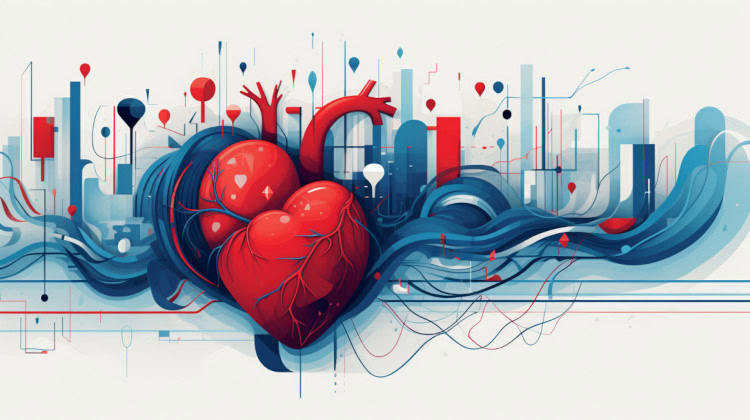
The products that you choose will have a major impact on your overall cannabis experience. Common factors, like the ratios of THC to CBD and other cannabinoids, the terpenes in the cannabis, and even if the strain is an indica or sativa can all play a role. There are so many compounds in the cannabis plant, changing one or more of them up has the possibility of making a big difference.
Cultivars
Opt for a 1:1 THC to CBD ratio for a satisfying buzz with a lower chance of heart racing.
Phenotypes
Should you avoid stimulating sativas or couch-lock indicas? Unfortunately, there's no clear answer. The labels "indica" and "sativa" are more general guidelines than anything scientific. Terpenes and cannabinoids play a much bigger role, but you may notice that a general pattern emerges for you. For instance, if every time you smoke a strain labeled "sativa" you find your heart racing, it's probably best to try something marked "indica" or an indica-dominant hybrid.
Terpenes
Although THC is the leading cause of an increased heartbeat, terpenes may also play a role. Terpenes are the fragrant molecules found in many plants, including cannabis.
Scientists have reported in preliminary studies that certain terpenes, such as linalool, pinene, and myrcene, may reduce heart rate at lower doses. Limonene reduced arrhythmias or abnormal heart rates in a rodent lab study.3
Other terpenes, such as citronellol, may increase heart rate.4
“Certain terpenes that are associated with specific strains may either increase or decrease heart rates,” said Dr. Kessler, “but the largest cause of increased heart rate seems to be high THC levels.”
More research is needed to pinpoint the exact cultivars, terpenes, and delivery systems to reduce fast heart rates after using cannabis.
When to Contact Your Doctor
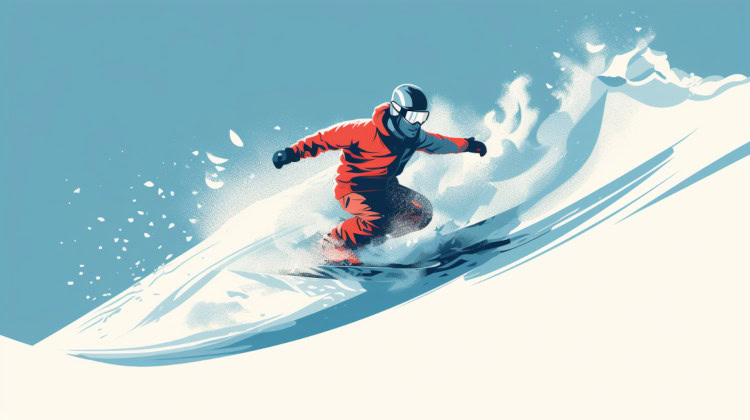
For most people, a fast heartbeat after using cannabis is uncomfortable, not dangerous. Most side effects from cannabis, like dry mouth or fatigue, are mild and self-resolving. But when symptoms become severe or persistent, seek medical attention.
A racing heart isn’t usually dangerous, but it’s worth checking in with a doctor if:
- You’re over 60 or have a heart condition.
- You take medication for blood pressure, anxiety, or depression.
- Your heart rate stays elevated for more than 30 minutes.
- You experience shortness of breath, fainting, or chest pain.
“Older individuals and those with pre-existing heart conditions, obesity, or high cholesterol should take additional precautions when using high THC cannabis,” Dr. Kessler advises.
Let your doctor know about lifestyle factors, including over-the-counter medications or activity levels.5 Even dedicated fitness enthusiasts should consider the cardiovascular changes caused by THC, including increased resting heart rate, blood pressure, and blood vessel dilation.
Cannabis side effects are usually manageable, but if they’re interfering with your life or peace of mind, it’s okay to step back, adjust your dose, or try a different product entirely.
References
- Page RL, Allen LA, Kloner RA, et al. Medical Marijuana, Recreational Cannabis, and Cardiovascular Health: A Scientific Statement From the American Heart Association. Circulation. 2020;142(10). doi:https://doi.org/10.1161/cir.0000000000000883 ↩︎
- Linneberg A, Jacobsen RK, Skaaby T, et al. Effect of Smoking on Blood Pressure and Resting Heart Rate: A Mendelian Randomisation Meta-Analysis in the CARTA Consortium. Circulation Cardiovascular genetics. 2015;8(6):832-841. doi:https://doi.org/10.1161/CIRCGENETICS.115.001225 ↩︎
- Alves QL, Silva DF. D-Limonene: A Promising Molecule with Bradycardic and Antiarrhythmic Potential. Arquivos Brasileiros de Cardiologia. 2019;113(5):933-934. doi:https://doi.org/10.5935/abc.20190233 ↩︎
- Santos MRV, Moreira FV, Fraga BP, Souza DP de, Bonjardim LR, Quintans-Junior LJ. Cardiovascular effects of monoterpenes: a review. Revista Brasileira de Farmacognosia. 2011;21(4):764-771. doi:https://doi.org/10.1590/s0102-695x2011005000119 ↩︎
- MacCallum CA, Lo LA, Boivin M. “Is medical cannabis safe for my patients?” A practical review of cannabis safety considerations. European Journal of Internal Medicine. 2021;89:10-18. doi:https://doi.org/10.1016/j.ejim.2021.05.002 ↩︎
The information in this article and any included images or charts are for educational purposes only. This information is neither a substitute for, nor does it replace, professional legal advice or medical advice, diagnosis, or treatment. If you have any concerns or questions about laws, regulations, or your health, you should always consult with an attorney, physician or other licensed professional.

